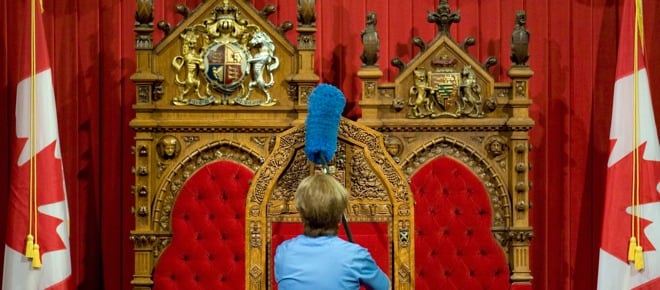That Senate reform bill: alive in the water
Why Harper is not creating a formally elected Senate
Share
 In a recent dead-tree Maclean’s I gave a little preview of the constitutional issues that the government’s piecemeal Senate reform effort, now launched, will raise if it is brought before a court. Readers may not be aware that the nature of Senate elections was discussed very recently in the Senate itself—in March, when a Senatorial Selection Act (S-8) was briefly debated there. The provisions of that bill have now been incorporated into a schedule to House of Commons Bill C-7.
In a recent dead-tree Maclean’s I gave a little preview of the constitutional issues that the government’s piecemeal Senate reform effort, now launched, will raise if it is brought before a court. Readers may not be aware that the nature of Senate elections was discussed very recently in the Senate itself—in March, when a Senatorial Selection Act (S-8) was briefly debated there. The provisions of that bill have now been incorporated into a schedule to House of Commons Bill C-7.
Today’s Star has a piece from Susan Delacourt in which scholarly all-rounder Ned Franks calls Senate elections “dead in the water” and “sure to get shot down by the Supreme Court”. I don’t want to call this a misrepresentation of the expert consensus, nor to challenge the stature of Ned Franks, but it seems to me that few other opponents of Senate elections are as confident as these quotes suggest. As I wrote, it is not clear exactly how much change Parliament is free to make to constitutional arrangements by statute alone. The Constitution Act text says that the 7/50 amending formula has to be followed before “the powers of the Senate and the method of selecting Senators” are changed. But under C-7, Senators are explicitly still appointed by the Governor-General as before. (“Senators to be appointed for a province or territory should be chosen from a list of Senate nominees submitted by the government of the province or territory.”)
Indeed, the flow of moral force through the text of the bill shows amusing evidence of judiciary-proofing. Look at section 2 of C-7:
2. The framework in the schedule sets out a basis for the selection of Senate nominees.
Key phrase, for the purpose of a future court test: “Senate nominees”, as opposed to Senators. The message to the courts is that we are not creating a formally elected Senate, but merely a means of bringing “nominees” to the attention of the Prime Minister. It’s an important distinction, also observed in s.3 of the bill:
3. If a province or territory has enacted legislation that is substantially in accordance with the framework set out in the schedule, the Prime Minister, in recommending Senate nominees to the Governor General, must consider names from the most current list of Senate nominees selected for that province or territory.
Key phrase: “must consider”, as opposed to “must accept” or “must recommend”. The bill is carefully keeping its toes within the boundaries set out by Peter Hogg in a discussion of a still earlier, failed Conservative reform bill:
…right now the Prime Minister could, if he wished, commission an informal poll as to the wishes of the electorate with respect to an appointment from a particular province. The Prime Minister could right now, and in fact has done, respect the choice of the electorate expressed in a provincial election, as we know has been done in respect of appointments from Alberta, where those elections have been held.
So all Bill C-20 does is make a formal consultation process available to the Prime Minister, should he choose to take advantage of it. As you will know, the Prime Minister does not need to take advantage of the consultation process if he doesn’t want to; the bill leaves that as a matter of discretion in the Governor in Council. If the Prime Minister does order the formal consultation process to take place, he does not have to respect the results in making recommendations for appointments.
I fully recognize… obviously a court would recognize that after Parliament has established the complicated process proposed by Bill C-20, no Prime Minister is likely to continue to make appointments in the old way. But I say that is a truth of politics, not a truth of law.
As crafty as those concluding words sound, I do not see how Hogg’s logic is assailable. I’m not an advocate of Senate elections per se. But Franks-style constitutional opposition to Senate reform requires acceptance of an absurdity: that otherwise qualified candidates for the upper house somehow become morally ineligible if they happen to have won a vote. The Constitution can and does stop people from entering the Senate solely by virtue of election. I don’t see how it can thwart a scheme for holding advisory elections that are binding only by virtue of the common regard in which we hold procedurally fair expressions of democratic sentiment.